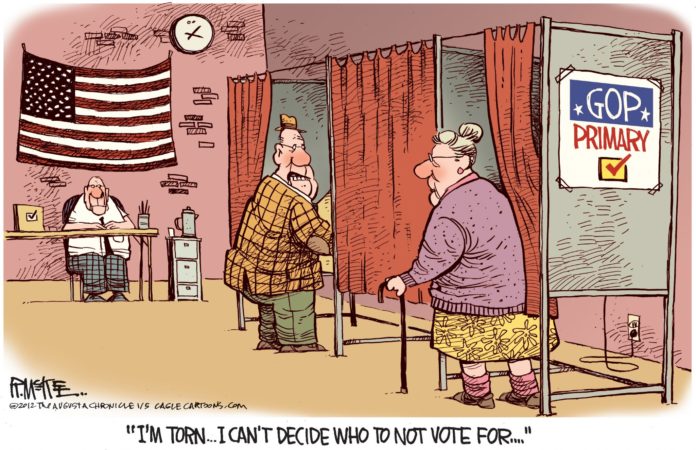BY SHARON MARTIN
 People with the most to lose in any election are often the ones who say, “Oh, I don’t pay any attention to politics.” Even more appalling are the folks who show up at the polls armed with instructions from their personal guru – their pastor, a talk show host, their best friend.
People with the most to lose in any election are often the ones who say, “Oh, I don’t pay any attention to politics.” Even more appalling are the folks who show up at the polls armed with instructions from their personal guru – their pastor, a talk show host, their best friend.
Politics goes on, even if you’re not interested or are uninformed. Political decisions happen with or without our consent. Bills are passed that benefit a minority of Americans because the majority of eligible voters either have been misled or are silent.
A friend of mine owned a small business. She voted, and she always voted against any increase in the minimum wage. She voted against union interests. She worried about government intrusion into her business, although she started her business with a loan from the government.
How many minimum wage earners do not vote? How many more have bought into the argument that a raise in the minimum wage could cost them their job?
Recently, I’ve seen an influx of non-traditional students in my college classroom. Several have been laid off jobs at which they worked for years. At least one lost her home because she was laid off.
If you’re going to school, raising a family, and dealing with money issues, it’s hard to think about the ugly political wrangling that’s taking place. But it’s essential that you do. What happens in the next election can determine your future.
Arguably, it was the repeal of government restrictions on banks that allowed the housing meltdown to happen. Still, there are those who rail against government regulations.
It was your tax dollars that bailed out the banks. Most economists agree that the economic results would have been much worse if we had not bailed them out. They also agree that we need regulations so another bailout is never necessary. But lobbyists for the banking industry are busy insuring that nothing changes. They buy politicians who sway your vote.
There are more distressed homeowners than there are lobbyists. We can vote out the legislators who favor campaign contributors over constituents. We can vote in our own self-interest and in that of our family.
Democracy depends on educated voters. We should vote our consciences, but only after we’ve done our political homework. We must know the issues and how they affect us. And we must question the voices of power that try to influence our votes.
Your vote is your voice, and for democracy to work, all voices must be heard.
– Sharon Martin lives in Oilton, OK and is a regular contributor to The Oklahoma Observer







